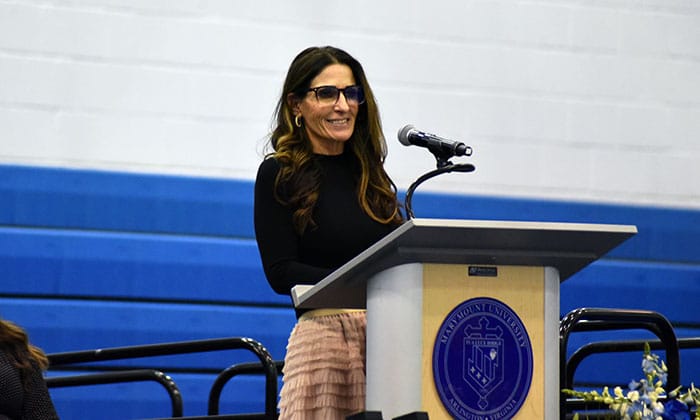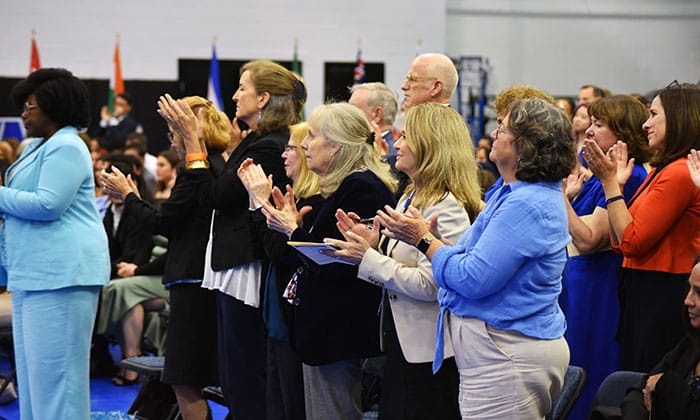About a decade ago, Chantal Bserani was given less than a five percent chance of survival. But last month, she stood on the stage at Marymount University’s Spring 2024 Nursing Pinning Ceremony, speaking to a crowd of hundreds while celebrating a milestone in her pursuit of a new career helping others.
Bserani, a 52-year-old mother of two, just graduated from Marymount’s accelerated second-degree Bachelor of Science in Nursing program as part of the University’s Class of 2024. Driven by a lifelong desire to help those in need, her journey to this moment was anything but typical. She initially planned on becoming a doctor but changed her major and earned a sociology degree in 1995, seeking to assist marginalized communities. She worked as a social worker and helped at-risk youth before pursuing a fitness career, running classes as a trainer, weightlifting coach and cycling instructor.
But her life took a dramatic turn at 39 when she was diagnosed with cancer, a disease that had already profoundly affected her family.
“My mom was one of seven children, and four of her sisters died from breast cancer all before they reached 60. And my mom herself died of ovarian cancer,” Bserani reflected. “I began having mammograms yearly at 21, and when I turned 30 it was every six months due to my family history.”
Despite her active lifestyle, she suffered from an emotional roller coaster as she faced bilateral breast cancer and underwent 14 surgeries over eight years, battling sepsis and septic shock that resulted from three hospital-acquired infections. It all started with a concerning mammogram that revealed five tumors – fortunately caught early at stages 0 or 1, but still fast-growing and aggressive. Longing for a reduced risk of cancer recurrence later in life, Bserani opted for a radical bilateral mastectomy.
“I remember every day after the surgery, I felt worse. Just lifting a glass felt like I had run a marathon,” she recalled. “After several days I finally called the doctor back, but I passed out before I finished the call.”
Rushed to the hospital with a fever of 106 degrees, Bserani’s condition worsened as she became septic.
“It was terrible – a priest came in at one point. Nobody told me at the time that I had a less than five percent chance of living,” Bserani said. “Nothing was working. They tried different cocktails of antibiotics but my fever wouldn’t break.”
Despite the dire prognosis and a multi-month hospital stay, she survived. But that was just the beginning of a long and painful journey that included continuous use of PICC line-administered antibiotics and the diagnosis of an autoimmune disease that attacked her reconstructive implants.
“I had to have surgeries to radically remove previous reconstruction, and they would last six to 10 hours each and the recovery would take months. Every surgery left me starting from a place of almost complete upper body immobility, zero energy and no strength,” Bserani explained. “My last surgery was in 2018, and now I have over 350 staples inside of me. You get used to the pain after a while, but it still took a lot of time to recover from all of the surgeries I went through.”
If there was one silver lining, it was how Bserani discovered a new calling. The compassion and dedication of the nurses she encountered inspired her to change her career path.
“I didn’t realize all of the things that nurses do – every aspect of a patient care plan is implemented by the nurses,” she said. “That includes vigilant assessments, interventions, precautions, calculating medication dosages, patient and family education, connection to services and rehab teams and, perhaps most importantly, advocating for patients and evaluating their progress both physically and emotionally.”
The COVID-19 pandemic solidified Bserani’s decision to attend nursing school. She wanted to make a meaningful impact on the world, so she chose Marymount for its accelerated BSN program and its personal approach and started in Fall 2022.
“It felt like every time I called other schools, I talked to someone different and no one knew who I was. But Marymount was great during the admissions process,” she said. “All of the faculty and clinical educators were amazing. The professors were tough on us, as they should be – because it’s life and death and we can really impact someone’s outcome.”
As a Marymount student, Bserani became a mentor to her peers throughout her classes, nursing simulations and clinical rotations.
“I was sort of the unofficial ‘mom’ in our cohort. I would tell them that there’s always something to do and to be proactive, because it matters,” she advised. “Patients will come into contact with us and we can anticipate their needs or help when we see they’re struggling.”
Bserani will soon start her residency at Georgetown University Hospital’s Post-Anesthesia Care Unit, bringing her journey full circle. From surviving a life-threatening illness to becoming a nurse dedicated to patient care, her story is one of resilience and transformation.
“Chantal’s story exemplifies the power of Marymount’s student-centric approach,” said Dr. Andrew Wolf, Director of Marymount University’s Malek School of Nursing Professions. “Our faculty are deeply committed to empowering each student to reach their full potential. They connect with students on a personal level, rallying around them to provide the individualized support and guidance they need to succeed. This unwavering dedication is at the heart of the Marymount experience.”









